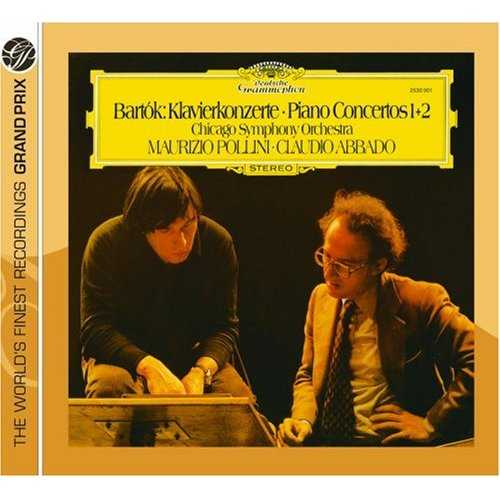
Performer: Maurizio Pollini, Shlomo Mintz
Orchestra: Chicago Symphony Orchestra, London Symphony Orchestra
Conductor: Claudio Abbado
Composer: Bela Bartok
Audio CD
SPARS Code: ADD
Number of Discs: 1
Format: FLAC
Label: Deutsche Grammophon
Size: 201 MB
Recovery: +3%
Scan: yes
01. Piano Concerto No.1, BB 91, Sz. 83 – 1. Allegro moderato – Allegro
02. Piano Concerto No.1, BB 91, Sz. 83 – 2. Andante
03. Piano Concerto No.1, BB 91, Sz. 83 – 3. Allegro molto
04. Piano Concerto No.2, BB 101, Sz. 95 – 1. Allegro
05. Piano Concerto No.2, BB 101, Sz. 95 – 2. Adagio – Più adagio – Presto
06. Piano Concerto No.2, BB 101, Sz. 95 – 3. Allegro molto
07. 2 Portraits, (Op.5) Sz. 37 – 1. “Ideal”
08. 2 Portraits, (Op.5) Sz. 37 – One Grotesque – Presto
Pollini and the CSO with superb Bartok First and Second Concertos
Maurizio Pollini recorded these concertos in 1977 with Claudio Abbado leading the Chicago Symphony Orchestra. Pollini’s is a top-of-the-line performance, and the CSO sounds great. Pollini and the orchestra have a deep bottom, unlike two later recordings I compare below. Pollini is very precise, no surprise, but his tone is full and round, unlike the sharper Bronfman with Los Angeles.
This Pollini disc is not directly competitive with the later Bronfman or Schiff recordings because it omits the Third Concerto. This 2007 reissue in DG’s Grand Prix series includes instead the excellent “Two Portraits, op 5,” with Shlomo Mintz on violin and Abbado leading the London Symphony Orchestra.
THREE RECORDINGS
Two recommended complete Bartok piano concerto cycles are those by Bronfman and Schiff. As Stravinsky so wisely said long ago, alternative interpretations of a score bring out all its potential. The Deutsche Grammophon engineering reveals a deeper ambience than these Sony or Warner recordings.The most exciting cycle of Bartok’s three piano concertos comes from Yefim (Fima) Bronfman and the Los Angeles Philharmonic, led by Esa-Pekka Salonen, and recorded in 1993/1994. This was the first recording of these works that I heard, back in 2001, and I have been taken with it ever since. Only now (9/3/13), having heard other recordings, can I appreciate just how great these performances are — the most exciting I have yet to discover.
The sound is not all it could be — it seems a bit thin and pinched. But this is no reason not to enjoy the thrills, which result partly because of a faster tempo, and partly due to Fima’s exuberant playing. He makes me laugh with pure joy throughout these performances!
The 1996 recording of Andras Schiff and the Budapest Festival Orchestra, led by Ivan Fischer for Warner is a rounder, less spiky, interpretation. The all-Hungarian team plays Bartok with a more elegant, stately, flair. Schiff’s tone is superb, and the sound of the orchestra is fuller, more reverberant, and more detailed than this Sony disc. Schiff makes the difficult Bartok sound easy, but he has said of the popular Second Concerto: “[f]or the piano player, it’s a finger-breaking piece. [It] is probably the single most difficult piece that I have ever played, and I usually end up with a keyboard covered by blood.”
BARTOK AND HIS PIANO CONCERTOS
Bela Bartok was a great modernist, and very influential, but less so than his peers Stravinsky or Schoenberg because, as Milton Babbitt once complained, his innovations tended to be particular to each composition rather than a system like Schoenberg’s 12-tone music. Bartok famously drew on Hungarian folk music, and his use of modal scales gives his music a uniquely odd quality in contrast to standard tonality, but he emphatically maintained that his music was tonal. The key was his mixing of modes, resulting in polytonality. What Bartok brought from the classical tradition was the strong influence of Liszt, Debussy, and Beethoven (thanks to the excellent November 1945 article from “The Musical Times”).Bartok performed the premieres of both the First and Second concertos. The premiere of the First was at the fifth International Festival of the International Society for Contemporary Music in Frankfurt on July 1, 1927, with Wilhelm Furtwängler conducting. The premiere of the Second was on January 23, 1933, also in Frankfurt, with Hans Rosbaud leading the Frankfurt Radio Symphony Orchestra. The Third was written shortly before Bartok’s death, and was premiered in Philadelphia by Hungarian pianist Gyorgy Sandor and Hungarian conductor Eugene Ormandy on February 8, 1946.
The First Concerto was considered quite spiky, modern, and difficult, and Bartok consciously set out to make the Second Concerto more performer and audience-friendly. On the second point he succeeded, especially with stronger melodic phrases. The Third Concerto is altogether more lyrical, more Romantic, less spiky and modern, basically the equivalent of Beethoven’s Sixth Symphony of Bartok’s piano concertos.
No usare este nuevo proveedor de archivos.
Thank you guys.
Thank you Boxset.ru
I Love Boxset.ru
I will be post to your site is display my CD and DVD here!